#art vs. fascism
Text

Digital painting for Werewolves vs Fascism.
19 notes
·
View notes
Text
1900s futurism

I'm on tour with my new, nationally bestselling novel The Bezzle! Catch me in TUCSON (Mar 9-10), then SAN FRANCISCO (Mar 13), Anaheim, and more!

I'm profoundly skeptical of the idea that the future can be predicted, and doubly skeptical that sf writers are any kind of prophet. The former grotesque fatalism (if the future can be predicted, then what we do doesn't matter); the latter is tragicomic hubris.
If you'd like an essay-formatted version of this thread to read or share, here's a link to it on pluralistic.net, my surveillance-free, ad-free, tracker-free blog:
https://pluralistic.net/2024/03/07/the-gernsback-continuum/#wheres-my-jetpack
That said, few people have been more consistently useful in understanding and anticipating (and yes, building) the future than my friend and colleague Karl Schroeder, whom I've known since I was 16 years old. Karl was the first person I heard say the world "internet." Also: "fractal," "World Wide Web," "ftp," and numerous other touchstones of the future just over the horizon.
Karl is, in fact, a futurist ("foresight consultant") who approaches the work with the same shrewd insight, wild imagination and humility that he brings to his fiction. In a new essay written with both his futurist and sf writer hats on, he nails down the toxic shadow cast by the 20th century sf, or, as he calls it, "The Science Fiction of the 1900s":
https://kschroeder.substack.com/p/the-science-fiction-of-the-1900s
Karl starts by describing the odd "double vision" of the future of the 1900s. On the one hand, many of us (myself included) were convinced that nuclear armageddon was inevitable. Unlike the unhinged architects of the nuclear arms-race, realists understood that a nuclear war would effectively end the future. As Einstein put it, "I know not with what weapons World War III will be fought, but World War IV will be fought with sticks and stones."
But the flipside of that certainty that the future would end with the first nuclear strike was the belief that if we could just somehow walk the tightrope over the chasm of nuclear holocaust, we'd emerge in a future worth looking forward to: "a new era of peace and prosperity for all."
Contrast that with the existential dread of today's polycrisis: environmental collapse and political decay up to and including fascism. These aren't the binary proposition of nuclear annihilation vs Utopia – rather, they're a continuum of worse-and-better outcomes of every description. As Karl writes: "It’s not that simple. Our future now is an exhausting spectrum of scenarios, each with its own promise, and its own problems."
For Karl, we have entered a new epoch, but we've dragged in the long-expired way of imagining (and hence creating and navigating) the future with us. What makes this a new epoch? For Karl, it's the kind of future on our horizon. He cites Charles C Mann’s 1491, a superb history of the Americas before Columbus:
https://www.penguinrandomhouse.com/books/107178/1491-second-edition-by-charles-c-mann/9781400032051/readers-guide/
1491 radically reframes "the patchwork of propaganda and inference" that makes up the received narrative of the so-called "New World." It describes a land of flourishing cities, art, science and culture "in the Americas while Rome was just getting its act together." Contact with colonizing Europeans was a disaster for First Nations people, who call this period "The Invasion." It was an epochal break.
Futurism is an inextricably historical discipline. The willingness of some settler-colonialists states to consider this epochal break forces us to reframe our literal place in history, the story of the land under our feet. At its best, this futuro-historical work can begin the long work of reconciliation, as with the Canadian government's promise of $23b in reparations for the First Nations people who were kidnapped as children and sent to murderous "residential schools" before, during and after the Sixties Scoop.
The sf of the 1900s is no longer fit for purpose, if it ever was. It's a literature that was steered by open fascists like John W Campbell, who explicitly saw the literature as a means of inculcating a societal narrative of the triumph of white, corporate technocracy over all other forms of government:
https://locusmag.com/2019/11/cory-doctorow-jeannette-ng-was-right-john-w-campbell-was-a-fascist/
Karl isn't the first sf writer to try to overturn this orthodoxy – indeed, it was continuously challenged by radicals within the field, as with the New Wave, personified by the likes of Samuel Delany and Judith Merril (who both mentored and introduced Karl and me):
https://pluralistic.net/2020/08/13/better-to-have-loved/#neofuturians
The cyberpunks took a good hard run at it, too. For plenty of writers (including me), Bruce Sterling and William Gibson's 1981 story "The Gernsback Continuum" was a wake-up call:
http://writing2.richmond.edu/jessid/eng216/gernsback.pdf
Not for nothing, William Gibson has long insisted that his 1984 classic Neuromancer should be read as utopian: after all, it depicts a future in which the inevitable nuclear war only reduces a few cities to radioactive ash, sparing the rest of the planet.
Bruce Sterling once paid me the supreme compliment of describing a 2003 story I wrote about the ways that algorithms will enshittify self-driving cars as "making everybody else in the business look like they live in a dark basement growing on the mulch from old STAR TREK scripts":
https://craphound.com/stories/2005/10/12/human-readable/
Schroeder – along with today's new radical sf writer cohort – wants to fashion a fictional futurism that is fit for this world and its crisis: "in our modern technological society, science fiction tells us what to spend our time and money on." The fact that our mediocre billionaires are mired in the sf of the 1900s means that we're getting some decidedly old-fashioned futures.
For Karl, Musk is a poster-child for this profoundly conservative, backwards-looking vision: "He’s fighting the intellectual battles of the last century, a 1900s hero dropped into the 2000s with an unlimited budget to reshape the future to fit the era he’s from." Musk's obsessions – "Space flight. Settling Mars. Cyberpunk-style brain-computer interfaces. Artificial Intelligence. Self-driving electric cars. Humanoid robots." – are 1900s science fiction.
Ironically, much of this fiction labels itself "hard sf," despite the fact that interstellar travel is utter fantasy – as is mass-scale, near-term interplanetary civilization:
https://pluralistic.net/2024/01/09/astrobezzle/#send-robots-instead
Karl wants "a future for the 2000s." He points to some efforts to make this happen, like Neal Stephenson's Hieroglyph anthology, edited by Ed Finn and Kathryn Cramer:
https://www.harpercollins.com/products/hieroglyph-ed-finnkathryn-cramer
The "Hieroglyph" is Stephenson's shorthand for a recognizable, tangible, meme-able gizmo or other touchstone for a 2000s-era vision of the future – a replacement for jetpacks and flying cars. Karl's story for the anthology, "Degrees of Freedom," focuses on an abstraction (governance: "the single most important thing humanity can focus its creative energies on right now"), and by Karl's own admission, it's not quite the hieroglyph Stephenson was looking for.
But Karl did come up with a hieroglyph in a later work, the "deodands" of 2019's Stealing Worlds – a software agent "that believes it is some natural system, such as a river or forest, and acts in its own self-interest, that being the preservation and thriving of that natural system":
https://memex.craphound.com/2019/06/18/karl-schroeders-stealing-worlds-visionary-science-fiction-of-a-way-through-the-climate-and-inequality-crises/
(My own contribution to Hieroglyph was very gadget heavy – "The Man Who Sold the Moon," about autonomous lunar 3D printers. It won the Sturgeon Award):
https://memex.craphound.com/2015/05/22/the-man-who-sold-the-moon/
I've been impressed with Karl since the day I met him in 1987. There's no one whose thoughts on the future I'm more interested in hearing. I don't think that's a coincidence, either: Karl is an autodidact who was raised by a Mennonite TV repairman – the first TV repair shop in the Canadian prairies. If you want to understand the future, try being raised by someone who takes that kind of deliberate approach to which technology to adopt, and how.

Name your price for 18 of my DRM-free ebooks and support the Electronic Frontier Foundation with the Humble Cory Doctorow Bundle.

If you'd like an essay-formatted version of this post to read or share, here's a link to it on pluralistic.net, my surveillance-free, ad-free, tracker-free blog:
https://pluralistic.net/2024/03/07/the-gernsback-continuum/#wheres-my-jetpack
#pluralistic#science fiction#futurism#the future#reactionaries#tescreal#retrofuturism#scientifiction#karl schroeder#1491#genocide
123 notes
·
View notes
Note
If you don't mind me asking, why don't you really care for Tom King's version of Mr Miracle? I keep hearing so much praise about it.
Hoo boy.
Let me start by saying that I don't hate this run. The art's terrific, it's genuinely pretty funny, and there are a lot of heartfelt and memorable moments throughout the run. It even has one of my favorite versions of Granny Goodness. But a lot of the positive stuff is undone by King's incessant pessimism.
The original Fourth World was fundamentally about love conquering hate and compassion conquering fascism. All four legs of the original series show characters grappling with the pain they experienced and ultimately finding salvation through love (Scott and Barda through each other, Orion through Bekka and Lightray, the Forever People through their unity, etc.). It's easy to take one look at it and call it childish optimism, but it's important to consider that these books came out towards the end of the Vietnam War. The Fourth World's message of peace and love triumphing hate wasn't just empty sentimentality-- it was a serious political statement.
Tom King saw this and decided to make a story about how war is inevitable and endless, and how nothing really matters in the end. The war between New Genesis and Apokolips is presented not as an actual war, but a basic fact of life as much as gravity or the sun rising in the morning. Instead of showing how both Scott and Orion were able to survive and find happiness, Orion is presented as intrinsically evil (implicitly due to his heritage, which is a whole other can of worms). Major characters are killed off unceremoniously for cheap shock value. By the end, Scott Free is basically turned into something of a forsaken child, choosing to endlessly suffer. Despite all of its edgy posturing about the human condition and utilitarianism vs. idealism, I find that Tom King's Mister Miracle holds an infinitely more juvenile perspective than the original 70s run.
So yeah, that's my main beef anyway.
6 notes
·
View notes
Text
june books
The good soldier Švejk : and his fortunes in the world war 3/5 (i have to confess i skimmed over the last quarter of this bc it got VERY samey very fast but it absolutely does what it sets out to do which point out the absurdity of creeping fascism)
trouble 4/5 (the hands down winner of this library trip - not only a great homage to the sound of music but also features a bisexual lead and one of the best period representations of a trans character i've ever read. didn't realise until afterwards it's the same author as art and gwen are not in love but it makes sense bc i loved that one too!)
the jungle book I 4/5 (every time i have to apologise for loving this imperialist author but i re-read this and kim every few years and there are many and many quotes that form part of my DNA at this point)
swordheart 4/5 (re-read - love an unlikely love affair!)
paladin's grace 4/5 (re-read - upsettingly accurate portrayal of trying to love again post trauma/post domestic abuse with a cracking mystery/adventure happening in the background. really sets the scene for)
paladin's hope 5/5 (re-read - i can't help it i love the way men love! [steering one another through an ancient murder maze and having desperate life affirming sex while a long-suffering gnole waits in the hallway])
britt-marie was here 4.5/5 (re-read - BACKMAN!!!!!!!!!! i am in your WALLS!!!!!!!!!!!!!!!!!!! britt-marie is about finding how to impose your social structure and important base beliefs onto the world in a way that benefits both you and the world and ALSO it's about waking up after a long bout of depression where you burrowed into a cave and thought you'd never come out again and discovering there were people waiting for you all along and ALSO it's about going to paris and ALSO! it's about cleaning things with bicarbonate of SODA)
castle in the air 3/5 (re-read - alas for the days of my youth when i picked this book up as my first diana wynne jones and it changed my life! re-reading as an adult you notice a little more fatphobia than the first or second time around and feel a Trifle uneasy about the Fantasy Desert Culture Trope)
death by silver 3.5/5 (a rare non-reread! a great victorian gaslamp mystery featuring two interesting OCs. tw for past period typical abuse in all boys boarding schools)
a death in the dionysis club 4.5/5 (sequel to the above. loved the second one better than the first! is this bc there were fewer flashbacks? MAYBE! there's also an excellent negotiation scene halfway through that doesn't stick in my craw unlike Many that try and superimpose modern bdsm onto historical times)
and novel length fic!
An Ace that I Could Keep 4.5/5 (i've missed harriet_vane's writing so much! what a joyful return!)
WWMMD? (What Would Mianmian Do?) 4.5/5 (beautiful worldbuilding and thoughtful bdsm etiquette without veering into 'he would not fucking say that' territory)
Peerless Melons vs the Patriarchy 4.5/5 (hands down one of the most IC shen yuans i've ever read)
True Treasure 3/5 (love a rare-pair)
hey, share the weight a little 4/5 (LOVE A RARE-PAIR)
pale shadows of forgotten names 4/5 (madam lan lives!)
A word, a look, will be enough 5/5 (jaytim! jay! tim! by FEYBURNER!!!!!!)
Who is holding your hand? 4/5 (yiling patriarch supremacy!)
Palimpsest 4/5 (growth and healing? in yue qingyuan's economy?!)
now you’re tearing through the pages and the ink 4/5 (this fandom does SO MUCH with minor characters and every time i am more in awe)
anything you've read lately that i absolutely have to add to my list for july? please share if so!
7 notes
·
View notes
Text
undefined
youtube
I recently got into this 4 year old They Might Be Giants song, “The Communists Have the Music.” Music video directed by David Cowles and Jeremy Galante with art by David Plunkert.
Linnel:
On the one hand, Fran Lebowitz memorably said of Communism vs. Fascism that one was too dull and the other too exciting. However, our song takes its cue from somebody (I can’t remember who) in our high school, who once compared two bands (I wish I could remember which bands) by declaring that one had the power but the other had the tunes. This enduring metaphor seems to apply to any pair of things we can think of.
I see a lot of people who are interpreting this very literally: that it is about someone who is interested in communism not for rational reasons, but because they’re interested in the aesthetics. I don’t think this is supported by the song.
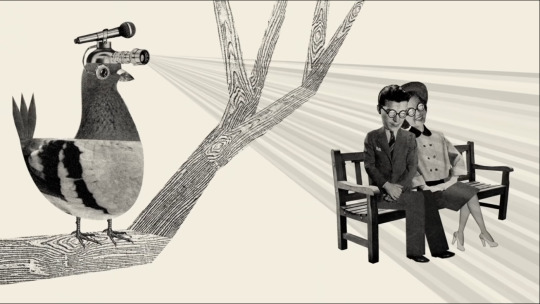
TMBG have been making music for 30 years. Music is really important to them, I don’t think they would use it to reference something they think is unsubstantive. Music is culture, music is creative and expressive, music uses literary devices frequently. Fascism is more concerned with top-down control and uses stifling techniques on its subjects. Communism is about bottom-up control where the people are allowed to be expressive. The song focuses on music because the singer is concerned with art, human spirit, and humanity in general. A literal approach to the song is that the singer is only interested in aesthetics but doesn’t understand the substance. Taking a creatively-minded approach opens up the song to embrace it as an anthem in favor of communism and left-leaning politics.
I think some of the major themes are art vs propaganda, humanity, dehumanization, paranoia, listening, watching, identity, and of course, politics. It is about finding meaning and connection in a landscape that is trying to divide us, make us scared or angry, and dehumanize ourselves.
I think the song itself is intentionally using symbolism and leaving its message up for interpretation because of this type of backlash to these types of messages.
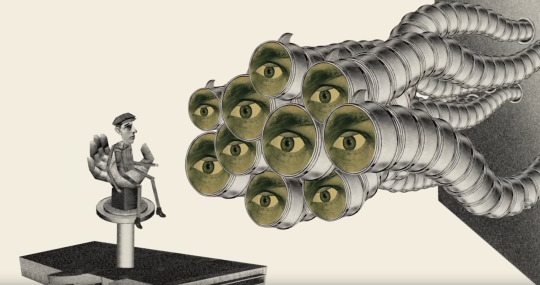
The music video itself is a satire of American Red Scare politics.The scare is still going today- we still can’t listen to songs or study the period without a fear of it.
Right away they dragged me to the Committee
To explain my un-American activity
They're gonna see they made a mistake
If they'd only let me play my mixtape
No matter the singer’s intent, the Committee refuses to listen to the music, refusing to hear the message.
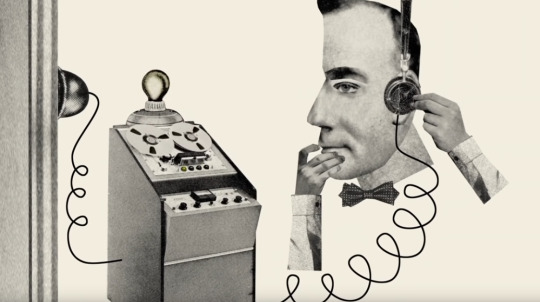
But, the music video is packed with people listening, only they’re listening in secret. This is a direct spoof on cold-war espionage and paranoia that led to US intelligence listening to its own citizens.
The music video draws a metaphoric comparison between spying and recording/listening to music.

Some of the listening devices are references to real-world spying devices and animal experimentation done by the CIA. A 70s CIA operation code-named Tacana explored using pigeons with tiny cameras to take photos. The CIA also tried using migratory birds to place sensors to test for chemical weapons. There was also an incredibly cruel operation called Acoustic Kitty which involved putting listening devices inside cats.

Animals are meant to be connected to nature, but the bulldog, pigeon, and cat have been turned into Frankenstein cyborgs. These technological monsters come about from the misapplication of technical knowledge and an excess of power. It is dehumanizing.
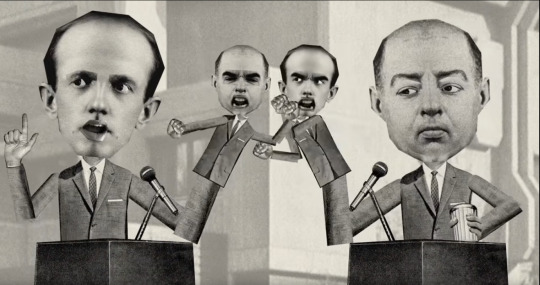
Another major theme in the video is political propaganda and the idea of watching. “The Committee” are just angry watching eyes, swarming like predators. The politicians watched on TV are disingenuous puppeteers putting on a political show. The propaganda is an endless progression of war machines and calls for violence.
“The fascists have the outfits.” A reference to Hugo Boss, who contributed to the fashions of the Nazi regime. I think that the singer is suggesting these other movements have style but no substance. The various forms of propaganda may be more enticing, but they lack humanity.

We watch propaganda, but we experience art. The act of listening is a transformative experience that connects us with our humanity. While the propaganda being pushed promotes war, hatred, and paranoia, the two spies who have been listening to each other in secret find love and human connection. The politicians seek to divide everyone, but the wall between these two has come down.
“I hear a melody and just as suddenly I know who I’m supposed to be.”
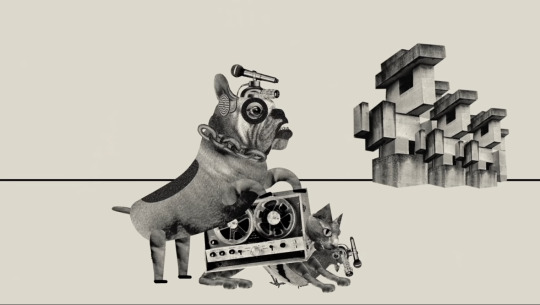
The fascist system is heirarchal, and the red scare paranoia is ultimately self-destructive as the animal spies all turn on each other. Perhaps it happened because they are all listening to the communist music, which explains why they are also dragged away to the Committee.
At the end, the singer himself is trapped in a television, which I believe is symbolic of a type of political reprogramming. His identity is now lost, and he’s only able to regurgitate propaganda.
undefined
youtube
The Internationale performed by Billy Bragg, which the singer calls his “backing track.” The international ideal unites the human race.
110 notes
·
View notes
Text
Were you to pitch me on a film about a dystopian government taking a bunch of youthful political rebels to the desert and hunting them in organized challenges as they try to earn their freedom, I would say that I'm too old for YA novels. Except Punishment Park is decidedly not this, instead presenting us with a documentary-style political commentary on America and the encroaching Fascism of the 1970s.
If you've been reading these filmposts, you know my dislike of the soapbox and the use of art as a pulpit, political and otherwise. That said, sometimes when you make movies about politics you have to actually talk about politics. This can also be well done, just like in the 1971 political commentary film Punishment Park.
Punishment Park is all in all a properly bleak film. Shot in documentary style, it tackles the hippy fears of Nixon-era internment camps for counterculture figures. This same cultural anxiety can be found in Thomas Pynchon's book Vineland, except this time it's Reagan-era internment camps, and the traces of this anxiety have trickled down all the way into the FEMA Camp conspiracies of the 90s and onward. For as outlandish as those conspiracies may seem, just a couple decades prior to the release of this film we'd seen the US Government legislate, build, and forcibly round up and imprison Japanese Americans regardless of their guilt or association.
Which is to say that as the hippies saw the iron-fisted crackdown against the excesses (civil rights protests) of the flower children at the same time as the ongoing military draft was dumping the country's young men directly into a meatgrinder shaped like a failing imperial war, the prospect of getting tossed into a desert prison for "thinking different" was less of a YA Novel premise than it sounds today coming from your weird aunt who stays on facebook groups too much. A lot of stuff was happening back then, and all at once. Punishment Park reflects this political turmoil, and makes no attempt to hide the politics of what is an explicitly political film.
SO, what about this film makes overt political commentary OK while leaving Adam McKay's attempts in baby jail for "being too self-righteous with it?" My answer to this lies in the combination of the documentary storytelling of the film and the movie's use of the Socratic Method.
See, one of the main gripes about soapboxing in films focuses on the strawmen this sort of script-as-pulpit storytelling generates. For the otherwise perfect film that is First Reformed, the youth group scene's handling of the opposing viewpoint is jarring when compared to the nuance the rest of the film exhibits. Punishment Park skirts the bad-faith readings of the opposing ideology, and harnesses the documentary style to do it.
The movie is set in two parts, exchanging points of view as it hops between them. The first part is the action of the film, showcasing hippies in the desert running for freedom as the cops hunt them down, all of the captured by a team of foreign documentary filmmakers. The second part showcases prisoners in a kangaroo court of sorts as they are questioned by a board of Union reps, draft board members, and other community administrators in something half trial half Hayes Commission pt. 2. Enter the Socratic Method.
The desert section of the film stands well on its own. A minimal dialogue documentary style depiction of police brutality in a bitter commentary on jackboots serving The Man in what's basically Cop City: California. The interspersed trial footage brings to bear the overt commentary of the film. Punishment Park Vs America, facilitated through the board's interrogations of various counterculture prisoners.
The inquests held before sentencing provide us with the push and pull of ideas (intercut between desert scenes showcasing the output of said ideas) much like Magneto and Prof. X debate over a game of chess, but with significantly more oppressive power dynamics. This allows the film to present both sides of the argument bare faced, free of subtext. Pure clash of ideas, presented in a way too interesting to be preachy. It's organic, and nobody feels like a strawman.
Punishment Park pulls it off. The tirades against American Imperialism and police brutality in the film feel natural, unforced. The bad guys are presented as intelligent, rational people who are in fact supporting a fascist regime, and that makes things much more powerful. The Union Rep. and the Draft Board member are ordinary people, and the questions they pose to the prisoners awaiting the judgement of a sham trial are very much in tune with the culture of the time, as are the responses of the counterculture prisoners. It's a human film, and the humanity reaches out to even the inhumane cops killing hippies in the desert.
The best thing the film does is present us with the exchange of ideas. There is no fear of the other guys being right. Because they aren't, and any good ideological position should hold up against them. And they do, it just doesn't matter, because the system is rigged against them from the start, and no matter how much they rail against it the panel of concerned citizens sitting in judgement, the court will never judge in their favor.
It was never intended to.
#punishment park#filmposting#theres a lot here#not even mentioning the internal dialogue between the pacifists and the armed resistance within the dissenters#film#cinema#also the internment for counterculture figures ended up just being normal prison#drug war etc was definitely a means by which they could target these people
9 notes
·
View notes
Text
if anyone tells us (again) knowing ourselves as a zoomdare is micro-labelling we would ask them why would I only use word woman for the love for wheels our body aches for and how that is synonymous to us to the love for recreational martial arts or for putting in time to do something communally useful physically or mentally, to a want to soar. its a fine word that can encompass those things if you think about it (or depending on the society or context you come from, it's a given) but its insufficient to us especially since a lot of us come from a framework of sparktion and hearths, not gender.
no one has used the word microlabelling towards us specifically but many times we've been told even for just saying we're polygender or xenogender that terminology being 'so specific' is 'too personal' or 'not what gender is' etc. transmedicalists weaponize anti-xenogender and anti-nonbinary stances to justify bioessentialism. binary trans people who need to hear it from a transfemme juggling more genders and aesthetics than we can name opposing xenogender and nonbinary terminology will not save anyone and only serves to hurt all of us. you need only read the news to see that fascism and other reactionary movements have and will continue to futily try to kill us all.
If anyone weaponizes the above statement against transfemmes consider yourselves challenged to a duel, which for legal reasons since martial duels are illegal in our country (although sparring and recreational combat is not) we will define as showing for one on one moderated online in either FATE 4th Edition or the E20 rule system minus MLP (we are removing the MLP sourcebooks to spare you) for a player character vs. player character duel.
yes the fact the 2024 election is not far off may have something to do with airing this out. like what the fuck are we doing how does it honestly help to take issue with someone having a bunch of terms, as compared to thinking about where the terms come from and if they are appropriated which is a legitimate concern to have. do you know how many enbies have given us the 'why are you so into gender' talk via micro-agressions do you really think nonbinary people having a bunch of terms is the problem and not society vilifying gender expansive people generally for being able to express their personal gender as if prose or poetry or math and especially being hard on transfemmes whether or not we settle for being a conforming gal (and don't get to be) or play around with gender in ways that reject oppositional sexism out of hand all-together come on now.
can we please for the love of fucking gods take a moment to think about how our untreated or not fully resolved traumas combined with not having unlearned the way hierarchies categorize result in lashing out at each other. for fuck's sake. it breaks one of our older headmate's spark and all our souls to hear this kind of thing
#trans stuff#xenogender#polygender#can we uninvent the word microlabelling#on the other hand we'll get to see it fall out of fashion in our lifetime if we live through the next few decades so that will be nice#nonbinary#trans
3 notes
·
View notes
Text
that's an uncharitable interpretation and you know it.
No it really isn't. Because they didn't give you the result you wanted, you call them 'not communist' even though they openly espoused and followed Marx's critera.
Collectives are how societies work. humans are innately social beings that survive well in collectives. Government is a tool to manage and support larger collectives of people.
In these Authoritarian nations, the government is used as a tool to support an individual, rather than the vast population it's said to protect and support, because systems that were designed to help people were gutted and redirected by heartless, self-serving, conservative idiots that don't know what empathy is, or consider it an inconvenience.
You can call it 'conservative' all you want- If the left's defining ideals are of progress, community and materalism vs. the right's tradition, family and spiritualism then Maoist China, Soviet Russia, Communist Venezuela and Cuba are all left wing because they did believed in progress, community and materalism. You don't even TRY to refute this.
You also seem to forget that humans are naturally individualistic, that collectivist ideology will almost always be inferior to individualist ideology because it's farther from what a human's view actually is.
And finally- Exactly what I said. That it's a totalitarian (i.e. Extreme Authoritarian) government that will always end up with a dictator. You just admitted that the four big countries that tried communism and failed are exactly as I described them.
Don't fucking compare a philosophy based upon mutual support and aid of the working members of society to a system based on oppression and ethnic superiority. Fascism is an ideology that is on the OPPOSITE end of the spectrum of political philosophies to Communism. You'd know that if you knew what the fuck you were talking about.
And you'd remember that the most rundimentary understanding of politics, let alone the more complicated in depth aspects of it, know that there is a Left-Right Axis AND an Authoritarian/Libertarian Axis. And really, what matters more of all is that second one. The first is basically just what flavor of the second you prefer. Whether you are for big or small government is the true deciding factor in ideology. So even if we ignore that the extreme left AND right share tendencies (like antisemitism), they would still be bound close together as authoritarians.
In fact, I can demonstrate the connection between them right now. You know how communists in America today like to point to the wealthy elite and how so many are white men? Well, replace 'white man' with 'Jews' and 'working class' with 'Germans'.
See how few steps it takes from Marx's 'mutual support and aid for the working class' to Hitler's 'dominate and exterminate the Jewish elite for the German workers'?
Then again, the truth is painful to see.
18 notes
·
View notes
Text
WIPs
@ostrichmonkey-games tagged me to share some titles of current WIPs! A dangerous undertaking for me to reflect on.
SpeedRune: The Ironheart Wars
This is the first supplement for SpeedRune, my rules-lite ancient world fantasy game. Meet furry soot elves who have mastered the magical art of ironsmithing. Save talking ducks from a wicked salt spirit. Fight for the powers of a god inside a massive iron heart.
It also contains multiple full poems, like this one:

It's basically done and should be out later this month. Recommended if you like Morrowind, Epic of Gilgamesh, and talking ducks.
The Mummy vs Titanic
A PbtA party game where the movie The Mummy takes place inside the movie Titanic. Everyone grabs a bunch of playbooks (The Mummy, The Iceberg, The Peasant, The Academic, etc) and creates a madcap story while trying to make it to the lifeboats in time. While the story can go any number of ways, two things must happen.
The mummy must get its revenge.
The ship must sink.
Most of this is done, but I need to get some good playtesting sessions in to polish it, and that's hard!
Excerpt:
The Iceberg
You despise pride and seek to sink it to the bottom of the sea. You give signs of your inevitability. You cannot be stopped.
Loom: o o
Calve: o o
Thousand Year Old Yoda
You are the last of an ancient race cursed with perfect prophecy. You have foreseen war, betrayal, fascism, and death. In the face of this assured failure, will you find the will to fight on? Or will you retire to a swamp planet and become a complete weirdo? A hack of Tim Hutchings's Thousand Year Old Vampire, but you're a Yoda.
This is barely done. It's mostly a shitpost.
Ship of Theseus
This is a solo journaling game about captaining a ship across a weird ocean. When you retire or die, your ship and journal go to a new captain (thus the title).
The game is officially halfway done and in eternal playtesting. People have responded well to it! I have the other half of the prompts listed out; I just need to finish them. Maybe someday.
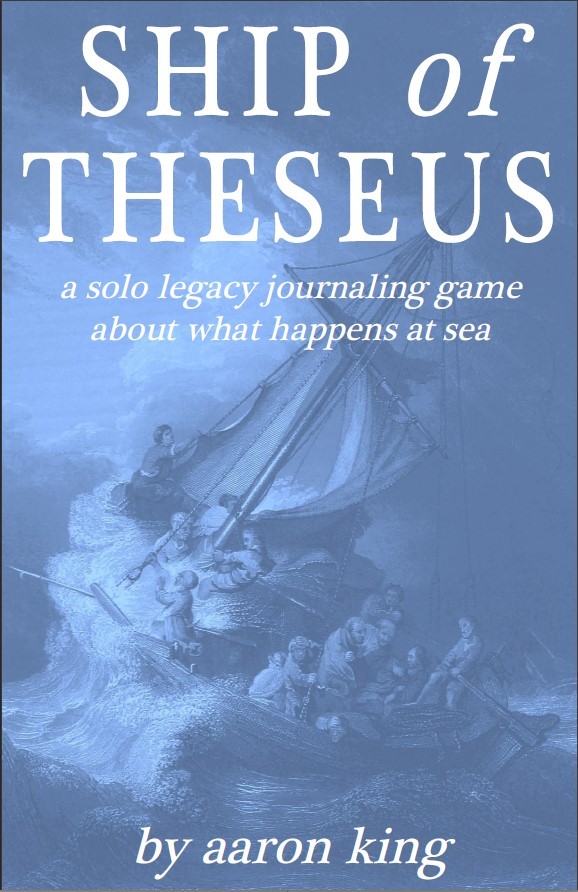
Tagging in @r-rook-studio.
18 notes
·
View notes
Note
I was thinking about superhero comics and really it’s amazing how American they are. Like I have a friend from a different country who said that superhero comics aren’t big where she’s from and they don’t really sell them there. And I guess it was the first time where I really made to see like how hero comics are just an American thing which makes sense why justice is such a big theme in them when really it is mostly punishment. Somebody once told me that america doesn’t like sympathizing or understanding but loves to punish. It’s a country that like to punish and not help despite how progressive America likes to think it is. And I never saw it that way until I started paying more attention to both like cancel culture and just the justice system and how true it is.
i mean the big two have their origins in jewish immigrants' response to nazi fascism, so it was very much borne out of what it felt like to be american in the sense that that identity was analogized to freedom compared to what the nazis represented. but obv we both know america has never truly been a radical state and despite eventually aligning itself against the nazis its entry into wwii was delayed and purposefully so bc it wasn't until there was a threat to america directly that joining the war effort mattered much to the government. so what comics ultimately represented was something immediately reactionary but not necessarily stable i think. and i don't think you can solely blame the creators of cape comics for that bc i mean who wouldn't produce art reflective of their immediate circumstances. but it does go to show how insulated the industry has been over time that it's never strayed far from the status quo of america vs the rest of the world, rather than truly rooting itself in any consistent idea of freedom and justice. the inextricable nature of american identity to cape comics is precisely its downfall bc it can rarely consider any worldview beyond that
14 notes
·
View notes
Note
Re that post about Kenzaburo Oe, you mentioned the term 1968 kids, talking about him and Hayao Miyazaki, how would describe that group? I get the gist of a certain kind of utopian artist from that generation, but I haven't heard it before, wondered if there was any other traits/anyone else you'd put in that group?
Definitely worthy of a fuller write-up, and I wish I had a concrete "unifying" source for all this, but Japan had a rapidly growing leftwing radical movement in the 1960's. The Anpo protests, a huge series of demonstrations against the US-Japan Security Treaty (which gave the US military bases in Japan) from 1959-1960 were the launching point, and they built on growing movements of unionization, environmental activism, and anti-militarism. It culminated in the 1968 seizure of much of the campus of the University of Tokyo by the 'Zenkyōtō' student activist faction, which was part of a global wave of student activism in 1968.
And like in so many places, 1968 was this movement's high water mark - they were awash in factionalism, police broke up their occupation, and support for them plummeted in the face of the violence they both initiated and recieved. In the 1960's members of these factions thought that they could seize political power, change the state, all that jazz. By the 1970's that dream was dead.
Most political-style artists were part of this movement, and shaped by that break - as political opportunity faded, they saw in their art a way to express their concerns, visions, etc that the political system would not. Since I am an anime person, this is where a lot of leaders of 70's and 80's anime would emerge from. Hayao Miyazaki and Isao Takahata were both animators at Toei Animation during this time, got heavily involved in the union efforts there - Miyazaki was the union's general secretary in 1964 - and were avowed Marxists. Mamoru Oshii was similarly active, participating in the Shinjuku Riot over the Vietnam War and identifying as Trotskyist-Left. There is an entire genre of Japanese cinema called New Wave which was part of and shaped by this movement - director Shūji Terayama would be a notable for films like 1971's Throw Away Your Books, Rally in the Streets, which I will mention because its creators included theatre director and music composer J. A. Caesar (real name Takaaki Terahara) who composed the soundtrack for Revolutionary Girl Utena, for the anime connection. There are of course hundreds more I could name.
I think their themes are well known - what united them as a 'movement' was A: they all mutually saw themselves that way, and B: they are the last generation to believe that their art could truly change minds. Miyazaki is making Nausicaa because he actually thinks it will turn people away from techno-fetishization, stuff like that. Creators after that make works about society, but they don't view them the same, their ambitions are different - insight vs activism, or reform vs revolution. Of course these creators will age and change - Oshii for example did so, he would famously criticize Miyazaki of being a typical "Anpo man" in feeling like his films were responsible for society and the world, saying such responsibility was itself a form of fascism (its Oshii, he says shit like this all the time). In his criticism you can see the identity of the 1968 generation reflected back.
They were more-or-less wrong, of course - art can change things, but not that much, and it turns out politics is way more complicated then their visions could contain. But I respect their conviction dearly and find the art they made to have something irreplacable due to that conviction, so its worth remembering.
43 notes
·
View notes
Note
She thinks the anime thong show is high art...
its about CHOSEN FAMILY its about FREE WILL and SELF EXPRESSION vs FASCISM through the lens of FASHION mako and ryuko are GAY
3 notes
·
View notes
Note
Yooo how was the ralph bakshi wizards movie? That clip is one of my absolute favorites on tumblr
I liked it overall! It was very heavy-handed, but I liked the paradox they set up with the use of technology at the beginning vs the end. I also liked the layering of real footage with the animation, both the unedited propaganda and the rotoscoped theatrical battles. On the propaganda, I liked that the "enemy" were not really interested in fighting until they saw it, and that it was the "ultimate weapon." The artwork was also lovely, they changed styles depending on where they were and I think drew on German Expressionism for Blackwolf's camp. And the voice acting was really fun, too.
I read on Wikipedia that Bakshi said the movie was about the creation of the state of Israel and the rise of fascism, which at first I assumed was about the violence of the state of Israel but thinking over it again that was probably. The wrong interpretation of what he said. So watch out for that. There's also the standard issues with things in the fantasy genre, namely racism and sexism. People with British accents are trustworthy and that kind of thing.
All that said I got the DVD from my local library and am planning on watching again with the director's commentary. At the very least I'm looking forward to hearing more about the art lmao
5 notes
·
View notes
Text
Got tagged by @luckshiptoshore (I've got the same first two as you)
8 shows to get to know me!
1. What We Do In The Shadows. This show really does have it all. A queer vampire polycule. A couple that's been together for 300 years and is still in love. The absolute BEST will-they-won't-they on television bar none. Guillermo's character arc is the best growth I've seen in a character in some time. It's hella sexy at all times. Everyone is so perfectly flawed and complicated. This show has inspired me to write more fanfiction than any show ever has! Also it's HILARIOUS, and tragic.
2. Our Flag Means Death. This is the sweetest purest love story and reminds me that no matter what you hate about yourself, or what others hate about you, there is someone out there who will love you for all those things! The representation is off the charts in this show and my love for every single babygirl member of the crew is immense. The only downside in the fandom is the discourse about Izzy. Like seriously, just let him be a part of the narrative. He's fun to hate and he's fun to play with in crack fic/art.
3. Doctor Who. This show will always and forever pretty much be my religion. The messages of love and intelligence over brute force and cynicism are so great. And the message that every single soul in the universe MATTERS and is important and unique and beautiful. And these messages are delivered through a gender fluid intergalactic nerdy tour guide with an infectious sense of WONDER for everything who takes you through time and space battling fascism and capitalism in a mess of camp effects and plot holes. I have seen all the classic and new series and I'm working my way through the Big Finish audios and EDA books.
4. The X-Files. Probably one of the best shows the small screen has ever seen. It's scary, it's suspenseful, it's funny, it's romantic, it's smart. It has simultaneously the longest non-sexual, emotionally intimate marriage AND the ultimate sexual slowburn. I could (and have) watch every episode a million times and enjoy them just as much every time.
5. Star Trek. I love every iteration of Star Trek, but The Original Series is my absolute favorite. It just gives me so much hope for the future. That someday, after all the human race's growing pains, after all the war and the racism, sexism, and homo/transphobia, after the greed and the poverty and pollution, we'll LEARN. We can be better. We'll explore and we won't explore to conquer or assimilate; we'll explore to learn about life and it's complexities and become even better versions of ourselves. And the friendship and sense of family on the Enterprise is just so beautiful. Also Kirk/Spock are the best definition of soulmates I've ever seen. The alien cultures within the world of Star Trek are just so well built and thought out (much better than in Star Wars). As an anthropology major, this FACINATES me.
6. Good Omens. The longest truest love story you have ever seen and one of the only (alleged) representations of romantic asexuality I have ever seen. Aziraphale and Crowley, an angel that doesn't fit in in heaven and a demon that doesn't fit in in hell but they fit with EACH OTHER and they love earth so dearly. It's humanism vs. religion and we win.
7. BBC Ghosts. I'm a sucker for the found family trope and this show does it so well. They're FORCED to become found family because there is literally no way for them to leave. All the ghosts are such nuanced (and autistic) characters and Mike is the best husband. He's so supportive of his wife and her crazy ghosts. BTW the U.S. version can go suck eggs in hell.
8. Willow. A return to the fun fantasy genre and the power of love and friendship that doesn't take itself too seriously. It's also a sapphic's dream! A demi-masc princess and her lady knight in a love story that kiss in the very fist episode? YES PLEASE! And Elora may be the chosen one but she sure does suck at it at first, and I LOVE that about her! The chosen one shouldn't be a perfect magic user, they should need to learn like anyone else. And THRAXUS BOORMAN!!!! Witty, slutty, leggy, longhaired, bisexual scoundrel who deserves to be in every single fucking scene! BUT RIGHT NOW IT'S ON THE KNIFES EDGE OF CANCELLATION SO GO SUPPORT IT ON DISNEY+ RIGHT NOW!
tagging: @someguywife , @indashadows , @glitter-mouse , @blakbonnet @bootlegsun , @nandorisms
9 notes
·
View notes
Text
Modernism & Fascism

Who’s Afraid of Red, Yellow, and Blue III 1967-1968
This painting is circling my Twitter FYP page in a meme about human-created art vs AI art.
Who’s Afraid of Red, Yellow, and Blue
The artist, Barnett Newman (1905-1970), is one of the foremost color field painters. Newman saw his work as a reaction to the horrors of World War II. “For Newman, figuring out what an artist could do after witnessing events such as the Holocaust and the bombings of Hiroshima and Nagasaki required ignoring all of art history, quote, “to start from scratch, to paint as if painting never existed before.”
In 1967 Newman finished his largest painting, Who’s Afraid of Red, Yellow, and Blue III. It shocked audiences at the time, who wrote letters to express their disgust and dismay. In the 1980s, a disgruntled painter named Gerard Jan van Bladeren slashed the painting with a box cutter. One of the main arguments the lawyer made in his defense was that the painting was a kind of cultural provocation, which called for a reaction. He was sentenced five months in prison, and people sent letters to the museum praising him, one even saying “this so-called vandal should be made the director of modern museums.”

Who’s Afraid of Red, Yellow, and Blue After the Attack (2006) Thomas Raat
“Anybody Can Do That”
The museum tried to restore the painting, but no one would take them up on the job. Eventually, Daniel Goldreyer said he could repair the painting. Four and a half years later the painting was revealed. It seems like it would be easy to repair the red part of the piece, but when it was revealed people immediately noticed the red paint looked different. Previously there had been a shimmering quality to the red that gave it a sense of depth, but the restoration had a flat-looking paint that, according to critics of the restoration, robbed it of its original power.
The biggest challenge to repairing Red, Yellow, and Blue III was the simplicity of the art. Regardless of how you feel about this painting, there is an undeniable truth about the craftsmanship. Usually, texture and brushwork can mask repair work, but Newman’s work is a swath of uniform color. No visible brush strokes, no uneven texture. Anyone who has worked with paint, especially oil paint, knows how particularly difficult this is to do The recreation tried, and failed, to recreate the delicate techniques of the original.
The painting was sent to a forensic lab, and it was revealed the paint Goldreyer used would be impossible to remove. The painting was destroyed a second time.

Cathedra (1951) Barnett Newman
In 1997, Bladeren returned to the museum in search of the botched restoration. When he couldn’t find Red, Yellow and Blue III, he found another painting by Newman titled Cathedra, and attacked it with a box cutter. He also scattered a packet of pamphlets to the floor that contained incoherent writing. At his second trial, Bladeren was declared mentally unfit and sent to a psychiatric institution.
You don’t have to like Newman, but this work has incredible technical skill.
But as Jacob Geller says in the youtube video essay “Who’s Afraid of Modern art” says, the debate around whether or not the art requires technical skill misses the point. “Reducing art to a linear connection between ‘skill’ and ‘value’ fundamentally just turns art into a commodity.”
Rejection of Modern Art is a form of Fascism
Newman was a Jewish artist, and Who’s Afraid of Red, Yellow, and Blue III was struck and spat upon in Germany because the attacker said it bore a mocking resemblance to the German flag.
In 2018, another sculpture by Newman, Broken Obelisk, was vandalized by white supremacists. White paint was poured into the reflective pool, and scattered around were posters with the phrase "it's ok to be white."
It was vandalized similarly before, with swastikas spray-painted across it.

Broken Obelisk (1963-1967) Barnett Newman
You’re not a bad person if you hate modern art, or any art created after 1800. Art is a subjective experience.
Part of the problem is also how modern art museums display artwork. When art gallery patrons are given more detailed descriptions of art, they experience more positive and fewer negative emotions.
But there is a pursuit of fascism to make everything of a specific aesthetic through rigid, culturally appropriate standards. As a nation’s mythology is built on its art, the subsequent art begins to feed into this narrative by continuously referencing this mythology. The result of this self-referential loop is a hierarchy that rejects anything new or divergent from the aesthetic. Thus, when art deviates from the established norms, it doesn’t feed into that nation’s mythology, eliciting criticism. This is because it doesn’t “contribute” to that society, but challenges it." (source)

The Nazi party seized 15,000 pieces of artwork, and in 1937 selected 640 of these pieces to be displayed in a derisive exhibition called "Degenerate Art." They wanted to invite public displays of anger and protest. This art was hung crookedly under mocking slogans like "nature as seen by sick minds.” Others were displayed with the extravagant price the original work sold for, to invite mockery and derision.
This pushed the Nazi's paradigm of what constituted good vs bad art.The argument made against this artwork was that these pieces showed no sign of craft that 'real art' does, so to celebrate them is an offense to the German people and their culture.
The fact that these pieces were held in high regard was seen by Nazis as proof of the insidious plots of the left. The art held critiques of sexual norms and norms of the family values that were important to Nazi respectability. Modern art, they said ,was made for “eradication of the last vestiges of racial consciousness.” New and transgressive styles by black and Jewish artists were indicative of their ‘degenerate intellectualism.” This is eugenics through the systematic devaluation of art. (paraphrased from here)
"Modern Art" is still used as a catch-all term to denigrate any work that ignores or rejects traditional Western standards of art and beauty, and the criticisms against modern and contemporary art are not dissimilar to the arguments made by Nazis against degenerate artwork.
"What “modern art” does, directly or indirectly, is question what constitutes ‘proper art’. The idea that Rembrandt and Shakespeare are the only valid forms of artistic expression lies directly in those artists being Christian, western Europeans. By widening the frame, by hanging a Picasso, Newman, or a Van Gogh under the same roof as a Friedrich, you visualize the idea that certain ideas are not superior. The privileges of aristocratic, white Europeans are directly threatened by the mere existence of “modern art”, which makes it a target." (source)
Here is a really fantastic article about the artist as cultural worker. Culture needs to be maintained. And art that doesn’t fit into a cultural narrative becomes a target. The rejection of non-traditional art is often a rejection of oppressed people.
Fascists didn’t vandalize “Broken Obelisk” because of its simplicity, they did it to assert power and control. The criticisms of the art are just a way to assert their own “superiority” by dehumanizing the other.
23 notes
·
View notes
Text
Rape and the Origins of Patriarchy
Here's a dark theory for you that links the whole nature vs nurture argument for men's behaviour.
There was this innuendo studios video I watched years ago with a line that changed how I fundamentally see politics and people, which I will paraphrase here: We tend to assume that action follows belief, but in reality belief follows action. People rarely change their action upon acquiring a new belief; on the contrary, people will tend to acquire beliefs that justify what they are already doing, and even seemingly contrary beliefs will get distorted as they are acquired, so that they can be used to also justify what they were already doing.
It is a tired argument amongst feminists whether or not men rape and commit violence because it's in their nature or if they were socialised to do it, and also what the origins of patriarchy even are. I've engaged in this discussion before, but I have a new theory:
Men were already raping back when they were male animals. Male animals rape, and it is a known fact. But female animals do not seem to experience trauma as we know it. Many female animals will fight off their assailant, or develop clever ways to avoid their advances, but being overpowered doesn't seem to have the same psychological affect on them as it does us. Male animals' entire goal in life is literally to impregnate a female, and they will do that for reasons that are essentially unknown to a human being with a moral conscience. After all, we have thinking brains, we have hobbies and literature, we have romance, we have art, we have passion. Sex isn't for babies for us anymore.
But if it is so universal that humans will invent all sorts of reasons and entire belief systems to justify our actions, then what of the nature of rape? Rape is not proof of 'the male's inherent evil' because rape in nature is not evil, for animals are not moral. But it becomes evil when humans become moral; when we gain the ability to develop transcendent attachments to one another, when we develop the ability to understand and process trust and loyalty and betrayal. Somewhere down the line, sex became something incredibly moral to humans. Perhaps we understood the power of intimacy and love and how it relates to the physical vulnerability of being naked and pleasured/pleasuring a partner.
But men still had that leftover instinct to rape. And what happens when you're committing an act that you and your ancestors have been doing forever that you're now starting to recognise is 'immoral'? You double down. You triple down. You lock that guilt so tightly away and bury it under philosophy, under rhetoric, under forces so powerful that you create whole religions out of them. You are terrified of your nature, of the implications of what your actions say about you, so you must go the opposite way as much as possible: no, your rape isn't natural, it's sublime. You are not a base animal causing suffering and death; you are actually representative of a Creator God.
Feminists tend to refer to man's womb envy; that he wants to be above nature in contrast to her. But what about his own nature? After all, in nature, male animals seem to rarely notice if they actually produce children or not; some will help raise the offspring, but also some species literally die after they have sex. The idea that men care about their lineage seems to have come out of nowhere. So, what if men don't, actually, care about their lineage? What if all of this is the biggest sunk cost fallacy of them all? That patriarchy, man's transcendence, and the obsession with lineage is all one big justification because man couldn't find a better one for rape?
You see this all the time on a micro scale. People generate unhealthy obsessions and behaviours and, when challenged and made to feel guilty, they will double down and pretend that they've always wanted this. Fascism is practically built this way: misogynists and rapists will invent a pseudo-religiosity about their beliefs in order to justify their cruelty and bigotry. I don't see patriarchy as any different, and I don't see why early patriarchal bloomings would behave any differently, either.
Obviously, we do not know what happened at the long dawn of humanity, and feminists more qualified than me speak on the subjects of exogamy and of the beginnings of agriculture with regards to the beginnings of patriarchy. But I believe this idea holds merit.
3 notes
·
View notes